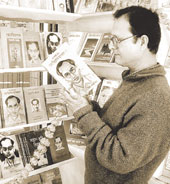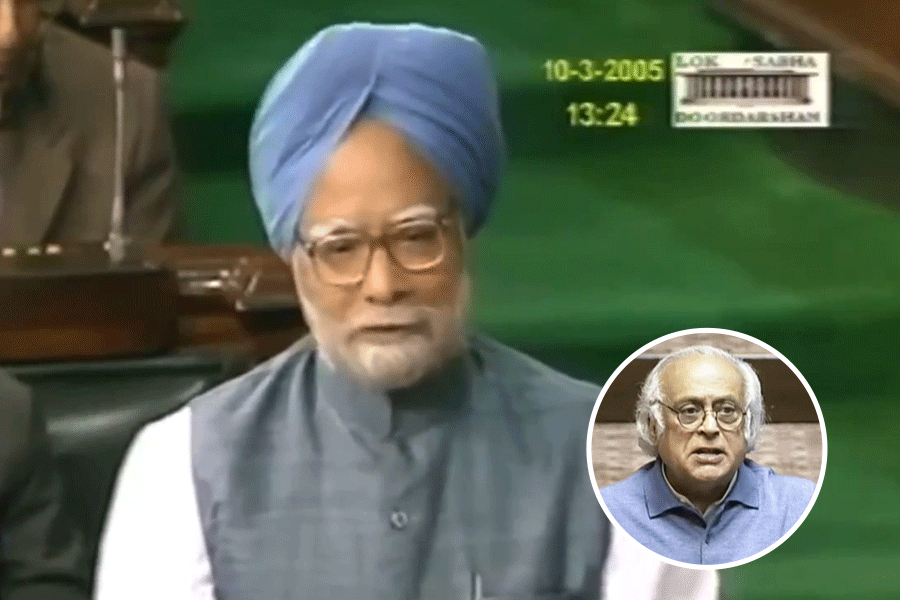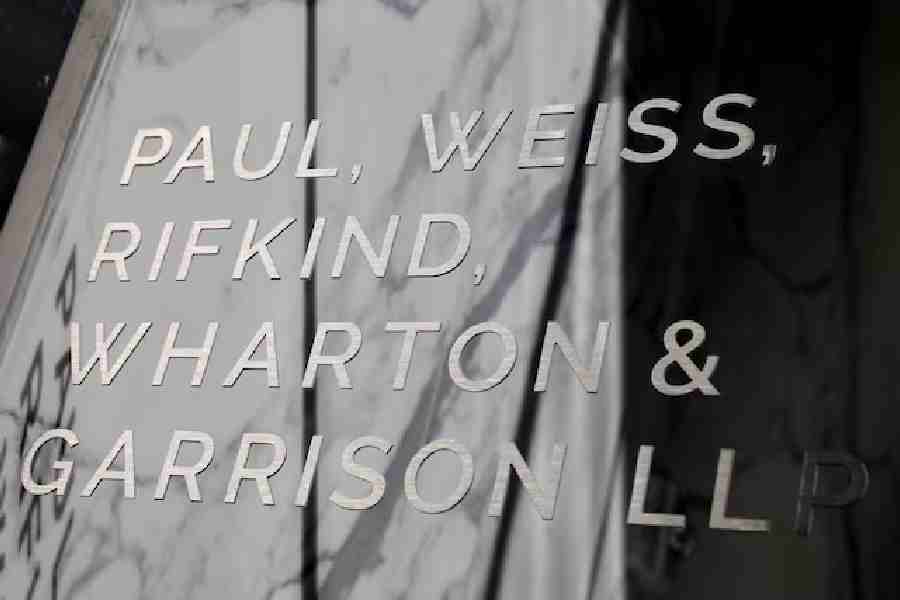 |
| A visitor browses through a book containing Jyoti Prasad Agarwalla?s poetry in Guwahati. Picture by UB Photos |
Jyoti Sangeet forms an integral part of Assam?s cultural identity, yet lack of standard notations might submerge it in a mire of cacophony
lThe writer teaches English at Bebejia P.K.S.H.S. School and is an honorary music teacher at Rudra Barua Sangeet Academy, Nagaon
Rupkonwar Jyoti Prasad Agarwalla was the architect of transformation and the soulmate of Assamese nationalism. A poet-philosopher, Jyoti Prasad was a bustling spirit of eternal dynamism. With his inborn musical talent, he made his flight from plays to lyrics, from lyrics to poetry, from poetry to stories and then to cinematography.
His indomitable spirit constantly strove to give shape to newness imbued with a traditional fragrance and impetus. It was a quest, which stood out as an exemplary path for all creative artistes.
The songs of Agarwalla have been studied and sung in Assam as Jyoti Sangeet. According to scholar and researcher Satyendranath Sharma, the total number of Jyoti Prasad?s lyrics ranges from 600 to 700. The Jyoti Rachanavali, published by the Asom Prakashan Parishad, has included 287 of them. Altogether 51 of the songs are from his plays Sonit Kunwari, Karengar Ligiri, Rupalim, Lobhita and Nimati Kanya.
The immortal number, Goshe Goshe Pati Dile, from the play Sonit Kunwari, is considered a trend-setter in modern Assamese songs. The lyrics, depicting nature, patriotism and the concept of beauty ? with tunes that are primarily a fusion of Assamese folk (Ainaam, Biyanaam, Borgeet, Bihu Geet and Kirtan tunes) and Western music ? have added a new dimension to Assamese music.
With his individualistic style of treatment he uplifted the prevalent trend of Assamese songs of that period, mostly influenced by Bengali melodies and provided a distinctive form to it, recognisably and intimately Assamese in essence.
The freshness of Jyoti Prasad?s songs can never get diffused. His evolutionary creative technique had an intense urge for discovery through the aroma of the native soil. The lyrics and tunes of the songs were soft, tender and deeply intimate. Many of the songs were composed to arouse the masses and impel them to join the country?s freedom movement.
Musicologist Birendra Kumar Phukan lauded the musical significance of Jyoti Prasad?s songs. According to poet and lyricist Keshav Mahanta, there is distinctiveness in Jyoti Prasad?s songs.
Artiste Dilip Sharma states: ?The songs of Jyoti Prasad have a certain distinctive musical elements as in Rabindrasangeet. Moreover, they possess a tremendous force of stirring up the Assamese spirit for which we can unhesitatingly term the songs of Jyoti Prasad as Jyoti Sangeet...?.
Quite a number of lyrics penned by Jyoti Prasad haven?t been set to tune till now. A few of them attempted by competent personalities like Loknath Goswami and Ramen Choudhury have gained popularity. The number Mor Ganat Jole-Mor Ganar Chumat, set to tune by Ramen Choudhury, and Aji Janatar Duware Duware by Loknath Goswami, have succeeded in retaining the intrinsic flavour of Jyoti Sangeet.
The number Luitar Akashat Torar Torawali, from the play Lobhita, was first set to tune by Bibekananda Agarwalla and later by Nizamuddin Ahmed Hazarika. Since both the tunes were accepted by Jyoti Prasad during his lifetime, they ought to be accepted as Jyoti Sangeet.
For the preservation of Jyoti Prasad?s songs, the government of Assam had set up an expert committee 20 years back with Nirmal Chakravarty, Dilip Sharma, Birendranath Dutta, Mina Agarwalla and Annapurna Baruah. Though not included in the expert committee, artiste Dilip Choudhury, who worked at the Jyoti Bharati of Tezpur, has been actively associated with framing notations of the songs in addition to holding workshops on Jyoti Sangeet in various places of Assam.
At the initiative of the directorate of cultural affairs, Assam, the expert committee took up the venture of publishing the correct notations of Jyoti Sangeet and in 1983 brought out the Sur Jeuti with 18 songs of Jyoti Prasad. In 2000, a new committee was set up with Birendranath Dutta as its chairperson.
This committee brought out the second part of Sur Jeuti in 2001 with 15 more songs. However, a few notations of the songs in both parts of the Sur Jeuti have unfortunate technical errors. For instance, the tonic note in numbers like (Kone) Goshe Goshe Pati Dile should be sa and not pa.
The attempts of Assam government to preserve the songs of Jyoti Prasad in the correct form is undoubtedly the most significant move forward; but the majority of the people in Assam, even keen enthusiasts of Jyoti Sangeet are totally ignorant about it.
Lack of advertisement about the Sur Jeuti and its unavailability in the bookstalls has led to this lack of information. Recordings of Jyoti Prasad?s songs have been continuing uninterruptedly. The notations of most of these recorded songs do not tally with the notations in the Sur Jeuti. The new generation is obviously more influenced by works to which they have easy access.
Surprisingly, the members of the expert committee, instead of reacting to the existing state of affairs, have simply been maintaining an incomprehensible silence. The noble purpose for which the expert committee on Jyoti Sangeet was set up by the government would be defeated if this lack of concern continues. What will the common people accept as authentic if the expert committee doesn?t alter its apathetic stance?
Another interesting aspect is that the notations of 18 songs of Jyoti Prasad from the Sur Jeuti have been included in a book titled Jyoti Prasador Geet Aru Swaralipi, compiled by Rajib Mahanta, published in 2001.
This collection clearly reveals that the notations of Jyoti Prasad?s songs were prepared by none other than Dilip Choudhury. Some of the notations have been rectified by Damodar Bora and the rectified versions are the ones that consist of technical flaws discussed earlier. The untouched notations perhaps can be totally relied upon.
In the late seventies an LP disc on Jyoti Sangeet, titled Swagata Swagata Satirtha was produced under the guidance of eminent music director, Ramen Barua. This production created tremendous impact on the listeners and contributed immensely in popularising the songs of Jyoti Prasad.
The need of the hour is that the authorities in Jyoti Sangeet come together and find a permanent solution to this escalating problem of preserving the master?s songs in a single accepted form of notation.










